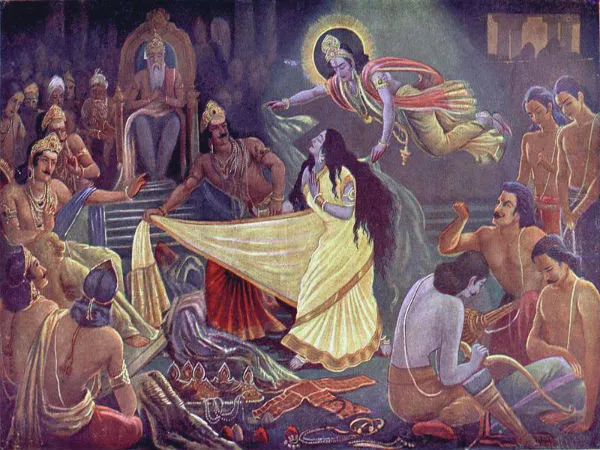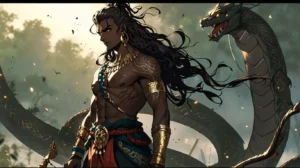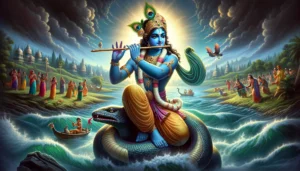Draupadi, a central character in the epic Mahabharata, stands as a symbol of grace under pressure, resilience, and the undying spirit of womanhood. Her narrative weaves through the fabric of the epic, reflecting the complexities of duty, honor, and the struggle for justice. Born from fire, Draupadi is not merely a princess but a figure of formidable strength and moral integrity, whose life story encapsulates the essence of human dignity against the backdrop of cosmic play and divine will. This detailed exploration seeks to unravel the layers of Draupadi’s character, examining her profound impact on the epic’s narrative and her enduring legacy in the cultural and spiritual consciousness of India.
Birth and Early Life
Emerging from the sacrificial fire, Draupadi’s birth itself is steeped in the desire for vengeance and justice. Destined to change the destiny of the Kuru dynasty, her life is a testament to the divine will and the intricate play of fate. Draupadi’s unique position as the wife of the five Pandavas further sets the stage for her to be a figure of significant influence and moral authority.
The Spark of Injustice
Draupadi’s humiliation in the Kuru court, where she is dragged by her hair and subjected to an attempt at disrobing by the Kauravas, marks a critical turning point in the Mahabharata. This act of grave injustice not only highlights the moral decay within the Kuru dynasty but also serves as the immediate spark for the eventual conflict. Draupadi’s question to the assembly about the legality of her being wagered in the game underlines the erosion of dharma (righteousness) and sets the stage for her as the moral compass of the epic.
Draupadi’s Vow and Demand for Justice
Following her humiliation, Draupadi makes a powerful vow of revenge, refusing to tie her hair until it is washed in the blood of Dushasana, one of her molesters. This vow is not merely a call for personal retribution but a demand for justice on behalf of the Pandavas and a stand against the adharma (unrighteousness) of the Kauravas. Her unwavering demand for justice and the restoration of the Pandavas’ rights ignited a fire in the hearts of the Pandavas and set them on a path toward reclaiming their kingdom and honor.
Catalyst for the Kurukshetra War
Draupadi’s experiences and her unyielding spirit act as a catalyst for the Kurukshetra War. Her plight and the injustice meted out to her become the moral justification for the war. The Pandavas, driven by the need to uphold dharma and fulfill Draupadi’s vow, are compelled to challenge the Kauravas. Draupadi’s role transcends the personal, symbolizing the struggle between righteousness and unrighteousness, and her call for justice serves as the rallying cry for the war that seeks to restore the moral order.
The Philosophical and Ethical Dimensions
Draupadi’s influence on the initiation of the Kurukshetra War underscores the philosophical and ethical themes of the Mahabharata. Her character challenges societal norms and questions the very foundation of justice, duty, and morality. The war, precipitated by the injustices against Draupadi, becomes a divine mandate to restore dharma, highlighting the complex interplay between destiny, free will, and divine justice.
Legacy and Cultural Impact
The legacy of Draupadi transcends the narrative confines of the Mahabharata, positioning her as a figure of empowerment and resistance in the face of adversity. Her story has been interpreted through various cultural, feminist, and spiritual lenses, highlighting her as a symbol of indomitable will and dignity. Draupadi’s presence in the epic serves as a reminder of the power of righteousness and the eternal struggle for justice, making her a revered figure in literature, art, and religious thought.
The Philosophical Dimensions
Her character invites a deeper philosophical reflection on the nature of suffering, the role of destiny, and the pursuit of dharma (righteousness). Her experiences and actions within the Mahabharata raise compelling questions about the nature of justice, the complexities of human relationships, and the pursuit of ethical living in a flawed world. Draupadi’s journey from a princess to a queen and finally to a goddess in the hearts of millions reflects the intricate dance of karma, free will, and divine intervention.
Draupadi’s narrative in the Mahabharata is a rich tapestry of courage, virtue, and unwavering faith in the face of overwhelming adversity. Her story is not just a recounting of historical or mythical events but a profound commentary on the human condition, offering insights into the nature of power, the complexities of duty, and the essence of womanhood. Draupadi remains a figure of immense inspiration, embodying the eternal flames of justice, resilience, and grace. Through her trials and triumphs, Draupadi continues to illuminate the path of righteousness, holding a mirror to society’s virtues and vices. Her legacy endures, a testament to the enduring power of character and the unbreakable spirit of humanity in the quest for truth and justice
Also read
Maharathi Karna: The Heroic Figure of Tragedy in the Mahabharata



[…] Draupadi: The Embodiment of Grace and Resilience in the Epic Mahabharata […]
Why did Draupadi marry 5 Pandavas ?
It’s her choice maybe